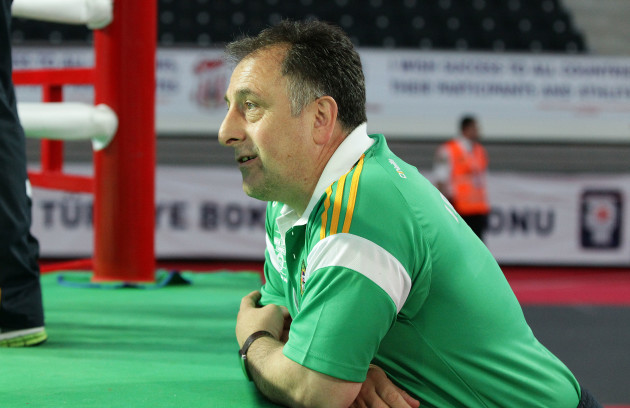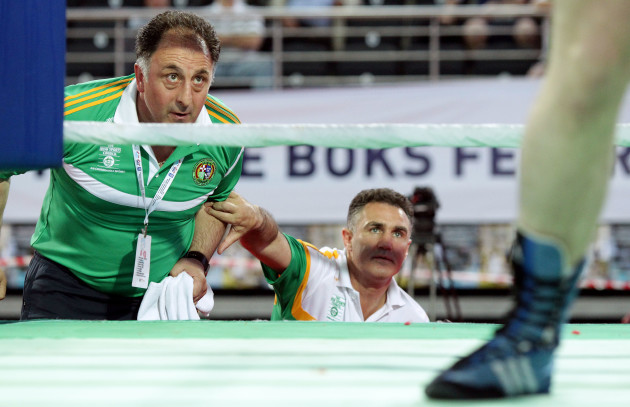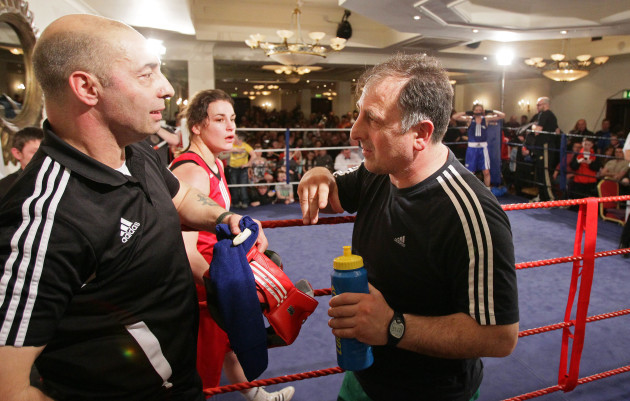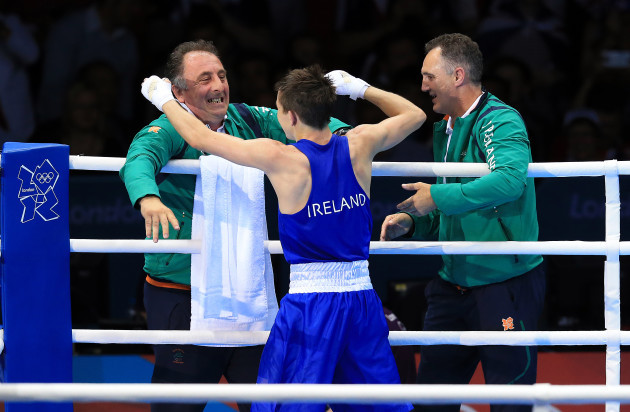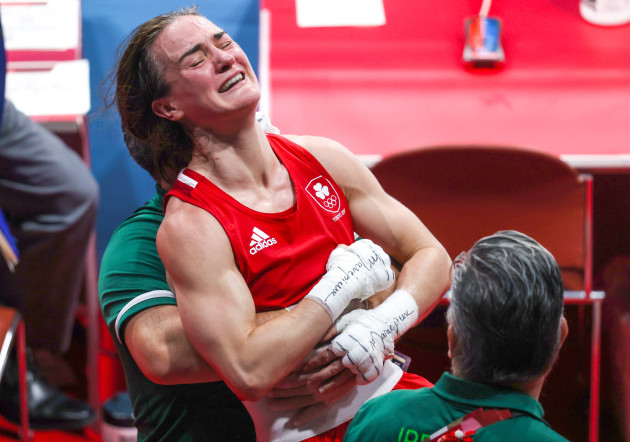IN WHAT MUST be one of the best accidents in the history of Irish sport, Ireland came to Zaur Antia before Antia came to Ireland.
Amateur boxing on this island changed forever when Cork businessman Dan O’Connell, an international boxing referee, found himself 5,000 kilometers away in the Georgian city of Poti in mid-2002.
O’Connell had been invited to the Black Sea port by his friend of 10 years and Georgian-boxing equivalent Zurab Tibua, the purpose of his trip being to train local referees and judges.
Down the back of the local gym in Poti, O’Connell spied Antia — Tibua’s best friend, as it turned out — working with several fighters. That he was blown away despite not understanding a word of the coach’s instructions tells us that whatever ‘it’ is, Zaur Antia has always had it.
Antia arrived in Ireland for the first time in late 2002 to apply for the role of head coach of the Irish-boxing High Performance Unit. He didn’t speak a word of English and so brought with him Tibua as his interpreter.
That came in handy even before his interview with Gary Keegan, who was in the midst of establishing Irish boxing’s transformative High Performance Unit. Antia met fellow job applicant Billy Walsh at the Ringside Club out the back of the National Stadium on Dublin’s South Circular Road. They shared a quick drink together, shooting the breeze through Tibua.
Immediately after his eventual interview, which included a trial training session with a selection of Irish boxers, Antia went directly to the airport with Tibua and flew home. He was later informed that he didn’t get the position, which went to 1988 Irish Olympian Walsh.
- For more great storytelling and analysis from our award-winning journalists, join the club at The42 Membership today. Click here to find out more >
The Georgian arrived in Ireland for the second time in the spring of 2003, this time without Tibua and with a one-way ticket sandwiched between the pages of his passport. Keegan had been so besotted by the Georgian’s translated coaching plan and trial session that he successfully battled for additional funding to create an entirely new position, that of ‘technical coach’, wherein Antia would work alongside new head coach Walsh.
Antia traveled without his wife, Nona, their then-eight-year-old daughter Natia, and their four-year-old son, David. Nona presumed her husband’s stay in Ireland would be brief. (She and the children wound up moving to Dublin two years later. All are now Irish citizens, as is the Antias’ youngest child, Georghe, who was born in Dublin).
To begin with, Antia knew virtually nobody in Ireland, and didn’t possess even pidgin English to change that. Indeed, his only point of reference upon first meeting his Irish boxing team was a photograph containing Eric Donovan which had been given to him before his departure from Georgia by one of his former fighters, an opponent of Donovan’s at the European Schoolboy Championships in 2000 who remembered he had once fought against ‘Ireland’.
Donovan, just 17 when Antia was appointed technical coach, wasn’t even yet involved with the Irish High Performance Unit (HPU). He had lost to Brian Gillen in the most recent 54kg senior national final in February 2003, just prior to Antia’s arrival.
The Kildare teenager was drafted into the HPU later that spring. Antia noticed Donovan was either reluctant to throw a left hook from his southpaw stance or he simply didn’t know how to do so properly. The reality is that both things were true: Donovan had waltzed through the underage ranks without having to the throw the shot which he felt left him most vulnerable defensively.
Long before it became a buzz-term in sports coaching, Antia would explain to his athletes ‘the why’ as well as ‘the how’ — i.e. here’s how to do it, but here’s why you should actually do it. He told Donovan — or, at least illustrated to him — in no uncertain terms that the backhand shot would change his career, not least because it was the shot to beat Gillen, a fellow lefty. They worked on it together over several months.
In the 2004 senior final (which actually took place in November 2003 in order to make room in the calendar for Olympic qualifiers the following spring), Donovan edged Gillen to win his first national title, and a first in nearly half a century for his club, St Michael’s Athy. That was half his life ago and though it’s been eight years since he departed the High Performance, Donovan, now 13-1(7KOs) as a pro, still speaks regularly with Antia who has maintained contact with him through the thick and thin since.
A special relationship in Donovan’s life is one of innumerable special relationships Antia maintains with his fighters, past and present.
But his impact on Irish boxing in macro sense has been arguably equally profound to his effect on the floor of the National Stadium or Abbotstown. We hear often of the ‘culture shift’ within Irish boxing early-2000s Irish boxing instigated by Keegan, Walsh and Antia — and it’s true that they masterminded a sea change. But it was equally overseas where Antia’s own reputation helped to boost that of Irish boxing, whose teams used to rarely make for enticing training partners in foreign camps on account of being seen as basically lazy messers.
Believing it unfeasible that their own charges could replicate the dazzling Cubans, amateur boxing’s world leaders, Keegan, Walsh and Antia sought to instead emulate the extremely successful Eastern Europeans. They took it on a step-by-step basis. The coaches firstly saw to it that Ireland would train and behave as ostensibly professionals (Antia famously guffawed upon learning that Ireland previously trained only twice a week, changing that instantly). They then began to infiltrate nearer Europe, the Irish team giving a good account of itself in scheduled camps away with the likes of Germany. Eventually, with word traveling of a prodigious — and serious — Irish squad, they were able to invite themselves to former Soviet states and vice versa, with the heavily connected Antia holding the master key to those particular boxing kingdoms; once upon a time, he had more boxers on Soviet international teams than any other territory outside of Russia.
None of Irish amateur boxing’s unprecedented success over the past 15 years would have been possible without its trainers and boxers being exposed to then-superior setups on a regular basis from the mid-’00s onwards.
Even as that gradual process played out, though, there were initial roadblocks for Antia personally: he couldn’t get a visa for the 2003 AIBA World Championships in Bangkok. He didn’t travel to the 2004 Athens Olympics, either, because Ireland had a one-coach-per-boxer policy and qualified only one boxer, Andy Lee, who was accompanied by Walsh. (Lee remains one of Antia’s most sworn advocates even 17 years on).
By the time the 2008 Olympics rolled around, Antia’s wife, daughter and son had at least joined him in Ireland and the program over which he jointly presided was beginning to seriously bear fruit: they qualified five boxers for Beijing, a massive improvement on the previous cycle. However, the Beijing Games proved to be one of Antia’s greatest challenges on a personal level.
While Antia was in China, his home city of Potia was devastated by Russian air forces during a war for the territory of South Ossetia. His wife, Nona, and their Irish-born son, Georghe, had returned home for a summer holiday and were forced to flee to the neighbouring Abkhazia mountains. Their adult daughter, her husband and the Antias’ first grandchild also fled to the hills from their hometown.
For days, Zaur was unable to contact any of them and, naturally, unable to sleep. Walsh, with whom he was rooming in Beijing, would wake to oversee the Irish fighters’ weigh-ins and Antia would emerge later in the day, cornering Irish fighters to what transpired to be their most successful ever Games from which they left with three boxing medals. Thankfully, he eventually discovered that all of his affected family members were safe. His scariest personal hell had intersected with his greatest professional achievement to date.
At London 2012, Ireland went one better, taking home four medals including Katie Taylor’s gold, Ireland’s first Olympic victory since Michelle Smith in ’96, and a first boxing gold since Michael Carruth in ’92.
Antia would have taken personal offence to the unmitigated disaster that was Rio 2016, much of which was attributed to departure from the Irish setup of his dear friend and colleague Walsh — understandably. But the last five years, and especially this summer, have proven that debacle in Brazil to be something of an aberration if not exempt from justifiable criticism.
On that note, it’s worth remembering that, in spite of its crowning three European champions (Joe Ward, 2017; Aoife O’Rourke, Kurt Walker, 2019) and a world champion (Kellie Harrington, 2018) among the significant haul of major international medals in the years since Rio, Bernard Dunne’s High Performance Unit was the subject of condemnation in an anonymously written document circulated to IABA members as recently as this spring. The concern over the running of the HPU was certainly not exclusive to the unknown author of the document: Dunne was in March given a new contract only as far as April 2023, 15 months before the Paris Olympics, a bizarre compromise passed 4-3 at IABA boardroom level after months of consternation.
Amid all of that rancourous airing of dirty laundry, there were private suggestions from some quarters of dissatisfaction towards Antia, whom some claimed to be past his best as a trainer in this ever-changing amateur-boxing scene.
Not only for that reason could it be argued that Kellie Harrington’s Olympic gold medal in Tokyo is his crowning glory, for the Dubliner embodies the type of boxer that Antia has for years strived to build. Harrington is what Antia would describe as ‘a universal boxer’, a fighter who can interchange between a southpaw and orthodox stance who is hard to hit and boasts every conceivable arrow in her quiver.
She beat every style of fighter on her way to the top of the Olympic podium: southpaw, orthodox, tall and rangey, slick and awkward, and a human bulldozer in the shape of her favoured final opponent, the reigning world champion Beatriz Ferreira. She is in some ways the personification of Antia in the ring, a fighter who moves with the game.
LinkedIn is good actually pic.twitter.com/SY9oG2wkrM
— Gavan Casey (@GavanCasey) August 12, 2021
Since 2003, Antia has been at the heart of about 140 major international boxing medals (Olympics, World Championships, European Championships/Games, EU Championships, Commonwealth Games). As he stressed to Irish journalists in the mixed zone following Harrington’s legendary 60kg final performance, nine of them have been won at Olympic Games: that’s just over a quarter of the country’s total tally across all sports since first entering as a free state in 1924.
Those successes have taken place under two — or three, if you include Walsh in his de-facto role — High Performance directors, under two entirely different scoring systems (the old points system and the more recent, professional-boxing-like 10-must system), and alongside a phonebook’s worth of assistant coaches, most recently the excellent John Conlan and Dmitry Dmitruk.
In this country’s most farcically tempestuous sporting scene, within the world’s most comically tempermental sport, Antia has been the one front-facing constant, impervious both to the politics which has driven away several of his esteemed colleagues — including Keegan and Walsh with whom he began his journey — and to the six-figure-salary offers by international boxing superpowers who have tried to tempt him their way so many times over the past decade.
He thankfully already has the Irish passport because without Zaur Antia, our recent boxing history would be as hollow as any conversation about the great coaches in our sporting history that doesn’t feature his name.
For more great storytelling and analysis from our award-winning journalists, join the club at The42 Membership today. Click here to find out more >


